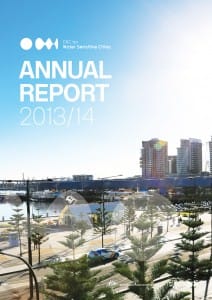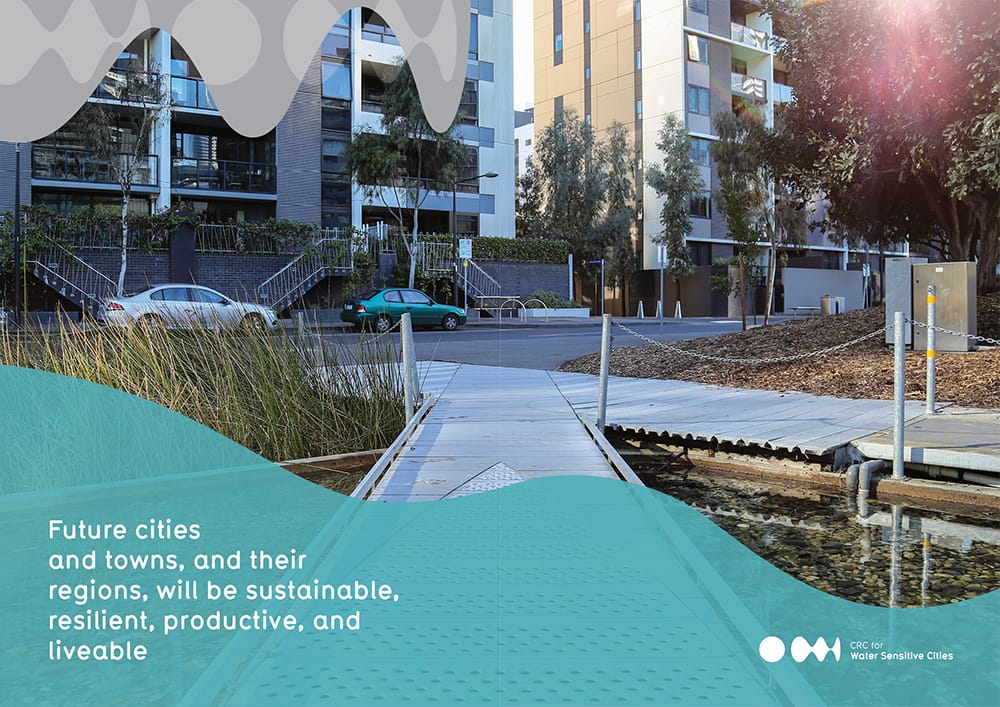What a year! – CRCWSC releases its Annual Report for 2013-14
 The CRCWSC has completed its second successful year of operation – a year focussed on building our research capacity and consolidating our research activities through integration and application. We also saw the number of CRCWSC participants increase from 71 to 79 organisations.
The CRCWSC has completed its second successful year of operation – a year focussed on building our research capacity and consolidating our research activities through integration and application. We also saw the number of CRCWSC participants increase from 71 to 79 organisations.
Research
Our research so far has yielded a new method for refining predicted regional meteorological conditions down to scales of 1 km2. This stochastic approach provides a level of internal consistency between local and regional simulations of global climate change models (those used in IPCC predictions), so that precinct-scale urban water management strategies developed by industry and governments can be tested for resilience against such global climate change scenarios.
Our stream ecology team has identified major causes of degradation in the ecological health of urban waterways, and has developed measures for their restoration through interventions in built-up catchments. These amount to a fundamental guiding principle for whole-of-water cycle management strategies in precincts and municipalities.
Our urban climatology team has produced evidence that during heat waves, irrigated landscapes and shade from trees can significantly reduce surrounding surface and air temperatures. This will help to reduce mortality and morbidity in urban communities, and ease budgetary pressure on urban health and emergency services.
Our stormwater quality teams have shown that pathogen levels in stormwater are comparable to those in secondary treated sewage, and that stormwater therefore requires tailored treatment before its fit-for-purpose use. The teams are well advanced in developing urban design features, along with soil additives for biofilters to improve their performance in reducing pathogens and micro-pollutants. They have engaged with industry to facilitate industry-wide applications of these innovations.
Techniques we have developed for analysing patterns in big water-consumption data are already bearing fruit for our water utility partners, helping them target water conservation interventions for greatest cost-effectiveness.
Our research publications in prestigious international journals were strong over the past year and included papers in Nature and Science; and we anticipate that the number of our publications will grow significantly this year also. Over the last year we published two book chapters, a total of 39 scholarly articles in world-class journals, 26 industry-focused reports and discussion papers, and 17 refereed conference papers. Participation in international conferences is likely to increase in 2014/15, as the solid international profile of CRCWSC activities and achievements results in invitations to present keynote and plenary addresses.

Synthesise
Over the year our research projects have continued their substantial contributions to the stock of knowledge. To assist our industry partners in applying that knowledge, we have initiated a new program of research synthesis. We undertook four synthesis projects, each hosted by one of our participants. These have been a great success for our partner organisations, demonstrating real site-specific adaptations and applications. The four projects’ main deliverables are discussion papers, presenting contemporary ideas for water sensitive development practices and increasing the capacity of our industry partners to adapt and synthesis our varied research findings.
As the majority of CRCWSC projects will reach their final stages in 2014/15, we are now planning more research synthesis activities to formulate context-specific applications of new knowledge and innovative practice.
Influence
More than 1,500 people have attended more than 64 unique activities in the last 12 months including workshops, seminars and other engagement activities across our three research hubs in Australia, in the Singapore hub, and internationally.
PhD candidates are an important aspect of the CRCWSC and a major deliverable under the Commonwealth Funding Agreement. Our target – 28 PhD students associated with the CRCWSC by 30 June 2014 – was significantly surpassed, and there are now 49 PhD and other postgraduate students. We anticipate a further increase in our PhD numbers, with around 15 new scholars by June 2015. We aim to develop a group of world-class graduates who excel in their field, are industry-ready, and will be ambassadors for water sensitive cities in Australia and internationally. To help achieve this, we have developed and implemented a PhD Support with the CRCWSC.
Fourteen students studied the module Designing Urban Water Futures, as part of the Masters in Integrated Water Management (MIWM) of the International WaterCentre (IWC), a CRCWSC participant.
A bright outlook
In FY14/15 we will continue to work actively with our participants to influence their practice through capacity-building and science-policy partnerships. CRCWSC activities will also engage with local communities. A number of community-based envisioning workshops are scheduled as part of one recently commenced project, aimed at integrating the research outputs from CRCWSC projects on building flood resilience in urban areas and two others that are associated with the development of modules in our integrated water management modelling toolkit.
We anticipate an increasing level of involvement from the private sector, including a higher participation of small to medium enterprises – and of the land development industry, both nationally and internationally.
Our research synthesis activities will continue to ramp up, with five design charettes already planned and a likelihood of more being initiated by our participants throughout the year. The quality and the content of these highly focused sessions will continue to increase. So will the calibre of research-industry partnerships within the CRCWSC, as our research projects mature and more research insights and outputs are delivered.
At the beginning of 2015 we will commence stakeholder consultation for the second tranche of CRCWSC projects. This will culminate at the Research Development Workshop in October 2015, followed by six to nine months of further scope development for selected projects. The new projects will commence in July 2016.
To view the report, click here.